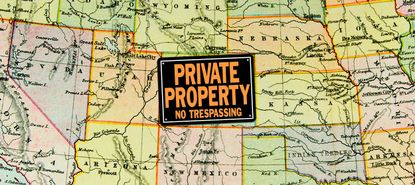Big Oil's plot to conquer Colorado
This ballot initiative about property rights sounds innocent. It's not.


Below the headline races on the Colorado ballot this year lurks an unassuming yet spectacularly dangerous initiative to amend the state constitution. Called Amendment 74, it would badly undermine democracy in the Centennial State — handing over a great deal of its sovereign power to oil and gas companies.
Here's how it would work.
Let's start with the goofy political theory behind this thing. It's a classic piece of self-contradictory libertarian dogma called "regulatory takings." The idea is that whenever the state alters regulations in a way that infringes on profits, property owners deserve compensation based on how the market value changes.
Subscribe to The Week
Escape your echo chamber. Get the facts behind the news, plus analysis from multiple perspectives.

Sign up for The Week's Free Newsletters
From our morning news briefing to a weekly Good News Newsletter, get the best of The Week delivered directly to your inbox.
From our morning news briefing to a weekly Good News Newsletter, get the best of The Week delivered directly to your inbox.
Thus the language of the Colorado initiative would add a phrase to the state constitution dealing with eminent domain, saying that private property shall not be "reduced in fair market value by government law or regulation" without compensation.
This is a moral argument that property owners — specifically oil and gas companies, who drafted the amendment and are paying for a big agitprop campaign on its behalf — have a right to the current market value of whatever they happen to own. To many Americans, that no doubt sounds pretty fair — indeed, the Colorado constitution already stipulates that the state must pay "just compensation" whenever it takes someone's property outright.
But it's profoundly disingenuous.
At the level of political theory, the problem is that property value is underpinned at all points by the state. Through its property law, corporate law, securities law, administrative apparatus, legal system, and monopoly on violence, the state creates property rights and allows such a thing as "fair market value" to exist in the first place. Libertarians like to pretend ownership is a relationship between people and objects, but it is really a relationship between people and other people. "Owning" something gives you a legal right to run to the state and claim the use of their power to enforce your dominion over something.
Therefore, owners do not have a pre-political right to compensation anytime their property rights are changed by the state. They have it only insofar as the polity decides it is deserved in such cases. To see such an idea in practice, you only have to look at the existing Colorado constitution, which already contains eminent domain protections. These stipulate compensation for times when people's property is "taken or damaged" by the state — for example, seizing someone's farm to build an airport, in which case paying compensation is perfectly reasonable.
But in addition to being philosophical garbage, the Big Oil amendment's language about "fair market value" makes it quite pernicious. The property rights in question are mostly extractive fossil fuel rights (as noted, homeowners, farmers, and the like are already fine), which are valuable almost entirely because companies do not have to pay for the enormous damage that digging up that oil and gas, selling it, and burning it causes to the rest of the United States and the world.
In other words, the "fair market value" of oil and gas drilling rights is not just the inherent product of state institutions from the very start. It's also the result of a gigantic implicit subsidy — one which analysts suggest could amount to perhaps $230 per ton of carbon dioxide emitted. But if the amendment passes, the state government would be forced to compensate for any regulation that would reduce the profitability of fossil fuel extraction. And given how profitable oil companies are, any meaningful regulation might be completely out of reach.
Effectively, this would harness the state on behalf of oil companies by making it extremely difficult for the government to exert its power on anyone's behalf but theirs. Thomas Hobbes thought such absolutist property rights ideology "tendeth to the dissolution of a commonwealth." And it would do so at a moment in which rolling back greenhouse gas emissions as fast as possible is the most important priority in the world.
So if you live in Colorado, don't be fooled by the propaganda Big Oil and its media sycophants are shoveling out. The property of individuals is already well-protected by the state constitution. The oil and gas industry just wants to seize Colorado's state power for itself.
Create an account with the same email registered to your subscription to unlock access.
Sign up for Today's Best Articles in your inbox
A free daily email with the biggest news stories of the day – and the best features from TheWeek.com
Ryan Cooper is a national correspondent at TheWeek.com. His work has appeared in the Washington Monthly, The New Republic, and the Washington Post.
-
 'Voters know Biden and Trump all too well'
'Voters know Biden and Trump all too well'Instant Opinion Opinion, comment and editorials of the day
By Harold Maass, The Week US Published
-
 Is the Gaza war tearing U.S. campuses apart?
Is the Gaza war tearing U.S. campuses apart?Today's Big Question Protests at Columbia University, other institutions, pit free speech against student safety
By Joel Mathis, The Week US Published
-
 DOJ settles with Nassar victims for $138M
DOJ settles with Nassar victims for $138MSpeed Read The settlement includes 139 sexual abuse victims of the former USA Gymnastics doctor
By Justin Klawans, The Week US Published
-
 Arizona court reinstates 1864 abortion ban
Arizona court reinstates 1864 abortion banSpeed Read The law makes all abortions illegal in the state except to save the mother's life
By Rafi Schwartz, The Week US Published
-
 Trump, billions richer, is selling Bibles
Trump, billions richer, is selling BiblesSpeed Read The former president is hawking a $60 "God Bless the USA Bible"
By Peter Weber, The Week US Published
-
 The debate about Biden's age and mental fitness
The debate about Biden's age and mental fitnessIn Depth Some critics argue Biden is too old to run again. Does the argument have merit?
By Grayson Quay Published
-
 How would a second Trump presidency affect Britain?
How would a second Trump presidency affect Britain?Today's Big Question Re-election of Republican frontrunner could threaten UK security, warns former head of secret service
By Harriet Marsden, The Week UK Published
-
 'Rwanda plan is less a deterrent and more a bluff'
'Rwanda plan is less a deterrent and more a bluff'Instant Opinion Opinion, comment and editorials of the day
By The Week UK Published
-
 Henry Kissinger dies aged 100: a complicated legacy?
Henry Kissinger dies aged 100: a complicated legacy?Talking Point Top US diplomat and Nobel Peace Prize winner remembered as both foreign policy genius and war criminal
By Harriet Marsden, The Week UK Last updated
-
 Trump’s rhetoric: a shift to 'straight-up Nazi talk'
Trump’s rhetoric: a shift to 'straight-up Nazi talk'Why everyone's talking about Would-be president's sinister language is backed by an incendiary policy agenda, say commentators
By The Week UK Published
-
 More covfefe: is the world ready for a second Donald Trump presidency?
More covfefe: is the world ready for a second Donald Trump presidency?Today's Big Question Republican's re-election would be a 'nightmare' scenario for Europe, Ukraine and the West
By Sorcha Bradley, The Week UK Published